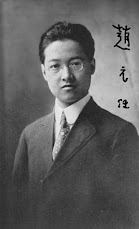Showing posts with label Readings. Show all posts
Showing posts with label Readings. Show all posts
手机改变我的生活 [Shǒujī gǎibiàn wǒ de shēnghuó]
每天早上我起床以后,用手机看天气,也看今天要做的事。
Měitiān zǎoshang wǒ qǐ chuáng yǐhòu, yòng shǒujī kàn tiānqì, yě kàn jīntiān yào zuò de shì.
Every morning after I get up, I use my phone to check the weather and also today’s tasks.
Cada mañana después de levantarme, uso el móvil para ver el clima y también las cosas que debo hacer hoy.

Reading "The Tortoise and the Hare" / Lectura "La carrera de la tortuga y la liebre"
龟兔赛跑
Guī tù sàipǎo
Guī tù sàipǎo
Wūguī pǎo báitù tiào,
乌龟 跑 白兔 跳,
The tortoise running, the hare jumping
La tortuga corriendo y la liebre saltando
Travelling to China / Viajar a China
您好,我是来中国大使馆办签证的。
您好,请填写签证表格。
您打算去中国做什么?
我要去中国旅行。
您要去多长时间?
我要去十五天。
请给我看看您的护照。
The 100 "shi" poem / La poesía de los 100 "shi"
Zhao Yuanren (1892-1982) opposed the 'romanization' of Mandarin Chinese. To defend his point, he wrote a poem of 92 Chinese characters, whose phonetic version is 'shi' (with different tones). His idea was to demonstrate how much richness was lost by 'phoneticizing' Mandarin Chinese.
Zhao Yuanren (1892-1982) se oponía a la 'romanización' del chino mandarín. Y para defender su punto escribió un poema de 92 caracteres chinos, cuya versión fonética es shi (con distintas tonalidades). Su idea era probar cuanta riqueza se perdía al 'fonetizar' el chino mandarín.
石室詩士施氏, 嗜獅, 誓食十獅。
氏時時適市視獅。
十時, 適十獅適市。
是時, 適施氏適市。
氏視是十獅, 恃矢勢, 使是十獅逝世。
氏拾是十獅屍, 適石室。
石室濕, 氏使侍拭石室。
石室拭, 氏始試食是十獅。
食時, 始識是十獅, 實十石獅屍。
試釋是事。
Reading 外滩 [Wàitān] The Bund
* Wàitān: The Bund, famous waterfront area in central Shanghai.* Wàitān: El Bund, famosa zona ribereña del centro de Shanghai.
"The Miracles of the Namiya General Store" novel / Novela "Los Milagros de la Tienda General de Namiya"
解忧杂货店 [jiěyōu záhuòdiàn]
东野圭吾 Dōngyě Guīwú
Atsuya, a 12-year-old boy, and his friends take shelter in an old general store for the night. The store seems abandoned, but in their mailbox they find a letter written 32 years ago.
Picking up the luggage / Recogiendo el equipaje
你知道在哪里提取行李?
Nǐ zhīdào zài nǎli tíqǔ xínglǐ?
Do you know where to collect your luggage?
¿Sabes dónde recoger el equipaje?
Exchanging money / Cambiando dinero
请问在哪儿可以换人民币?
Qǐngwèn, zài nǎr kěyǐ huàn rénmínbì?
Disculpe, ¿Dónde se puede cambiar Renminbi?
可以在机场换,可以在银行换,也可以在你住的酒店换。
Kěyǐ zài jīchǎng huàn, kěyǐ zài yínháng huàn, yě kěyǐ zài nǐ zhù de jiǔdiàn huàn.
Se puede hacer en el aeropuerto, los bancos y también en el hotel que se aloja.
太方便了!
Tài fāngbiàn le!
¡Que bien!
您好,我要换一百欧元。
Nín hǎo, wǒ yào huàn yì bǎi Ōuyuán.
Hola, quiero cambiar cien euros.
您好,请填写表格。
Nín hǎo, qǐng tiánxiě biǎogé.
Hola, rellena el formulario, por favor.
请问可以换多少人民币?
Qǐngwèn, kěyǐ huàn duōshǎo rénmínbì?
Disculpe, ¿cuántos yuanes se pueden cambiar?
可以换八百元人民币。
Kěyǐ huàn bā bǎi yuán rénmínbì.
Se puede cambiar 800 yuanes.
Chinese Literature / Literatura china
Chinese literature contains four masterpieces known as the Four Great Classical Novels 四大名著 [sì dà míngzhù].
Apart from that, 小红书 [xiǎo hóng shū] "Little Red Book" is very popular, a collection of quotes by Mao Zedong, the first chairman of the People's Republic of China.
HSK 3 Reading Who lied to whom? / Lectura HSK 3 ¿Quién mintió a quién?
一个年轻男孩,在公园遇见一位漂亮的女孩,就一直跟在她后面走了很长的一段路,最后这个女孩忍不住停下来问他说:“你为什么一直跟着我?”
他对她表白说:“因为你是我见过最美丽最有气质的女人,请你答应我,当我的女朋友!”
Chinese Basic Level (HSK 1) Graded Readings Index / Índice de Lecturas de Nivel Básico en chino (HSK 1)
When studying Chinese, an essential activity to gain skill in expressing ideas is reading. One of the difficulties I have encountered in learning and teaching the Chinese language is finding appropriate readings for each level. Here you have an index with basic level texts in order of difficulty that will help you to continue growing in the language. Try to read the Chinese characters.
Al estudiar chino, una actividad esencial para ganar habilidad al expresar ideas es la lectura. Una de las dificultades que he encontrado en el aprendizaje y enseñanza del idioma chino es encontrar lecturas adecuadas a cada nivel. Aquí tienes un índice con textos de nivel básico por orden de dificultad que te ayudarán a seguir creciendo en el idioma. Trata de leerlas en caracteres.
Subscribe to:
Comments (Atom)














